If you’re from Florida and you saw your state becoming red just a few weeks ago during elections, odds are you were not surprised. For many Southern organizers on the ground it was frustrating to see the uncomplicated ways Florida was discussed as election results rolled in. This week, Mijente chatted with organizers from Mijente partner New Florida Majority and Florida for All about organizing in the South, what obstacles they’ve encountered, what victories we can celebrate and what’s going on in Florida beyond the presidential election.

THE PANORAMA
The New Florida Majority (NewFM) is a grassroots organization part of Florida for all, a statewide coalition of FL based organizations that aim to mobilize infrequent Black and brown voters to elect Progressive candidates up and down the ballot across Florida.
“This year [as a coalition] we led the largest independent electoral campaign in the state of Florida,” says Natalia Jaramillo, Deputy Communications Director for the New Florida Majority.
“And it was women of color-led and is the largest Black and brown coalition,” says Natalia. She shares that it is comprised of of various groups such as NewFM that mobilizes African-American, Haitian and Latinx voters, the Florida Immigrant Coalition which mobilizes immigrant voters, The Dream Defenders that mobilize youth of color, Organize Florida that organizes voters of color in central Florida, the Service Employees International Union and faith organizations as well.
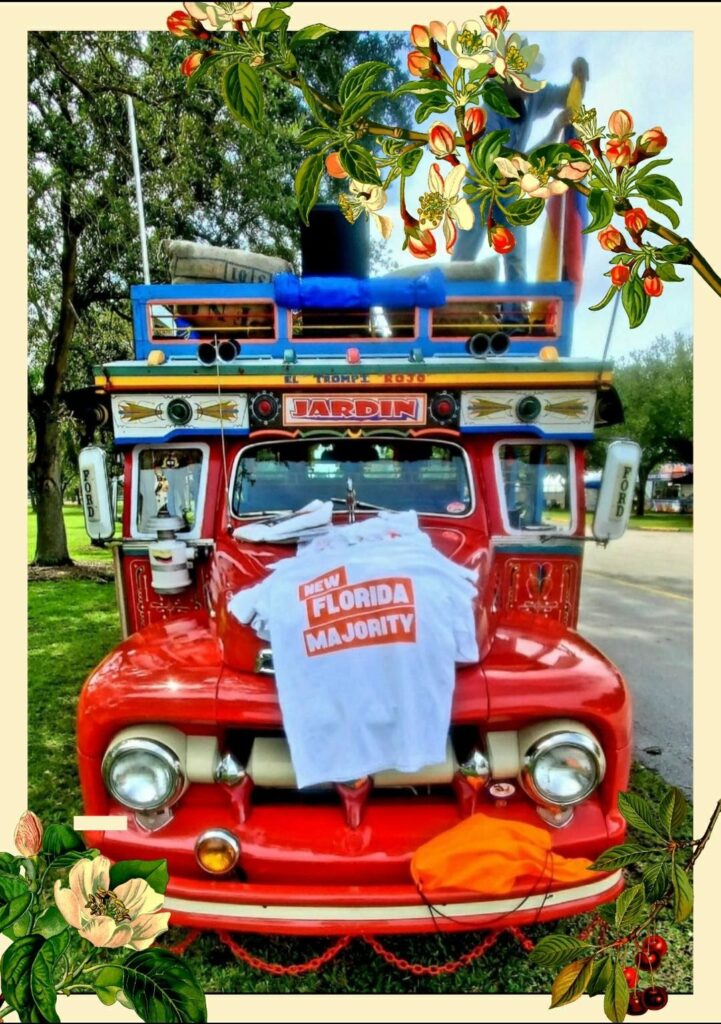
“We made 18 million calls, sent more than 6 million texts and knocked on more than one million doors in just one month.” Natalia shares that usually their door knocking numbers are higher than the calls and texts but because of the pandemic they had to shift their strategies this year. This year was massive in Florida not just in terms of what was accomplished but also in volunteer turnout and organizing. Natalia recalls there was a particular night after one of the debates that NewFM got flooded with calls.
“People were so enraged that we had over a thousand volunteers in one night. Flooding and flooding and flooding,” she says excitedly.
“That was very significant and there’s this feeling that we ‘lost Florida’ or people feeling disappointed about Florida. But we’re like, that is Florida,” she says as we nod to each other.
“It was expected, you know, we were all pushing for the margins. And it’s a swing state for a reason. And every single election, we know that it comes down to our percentages,” Natalia tells us. “For us, it’s not just about mobilizing people to vote for the presidential ticket, it’s about building power year-round and also mobilizing people to care about local elections and local impact.”
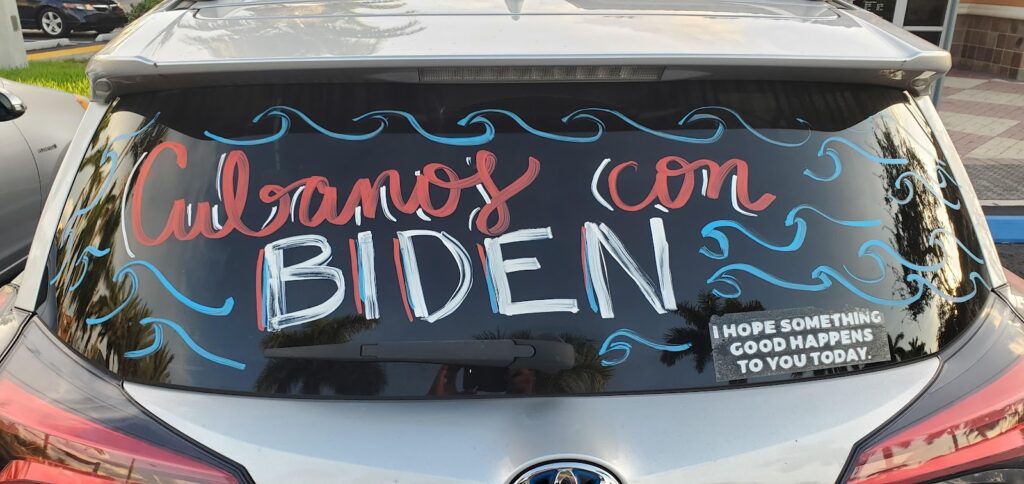
STORIES FROM ORGANIZERS
“For us, it’s a fight every day in Florida, every day,“ says Gina Romero.
On a Friday morning I meet up with Serena, Carlos and Gina over Zoom. They are all organizers with NewFM. Carlos Naranjo is from Colombia and organizes in South Florida with a special focus on Broward and Miami Dade County. He’s been organizing, doing political education and base-building with Latinx communities through NewFM for the past two years.
“Something that I really appreciate about the NewFM is our focus on the merging and creation of Black and brown power,” says Carlos, “knowing that it’s essential. We’re always in that intersection, the Black and brown intersection. And I think in Florida it’s especially important because we have a lot of Black migrants or people from the Caribbean.”
Serena Perez, originally from Quito, Ecuador came to the U.S. when she was 29, immigrating to New Mexico. Her background in organizing started in high school around the post-dictatorship right wing repressive governments, and being around all the energy of the 80s in Latin America. In New Mexico, she began to organize around immigrants rights with Somos un Pueblo Unido and then moved to Miami in 1999. Since the early 2000’s she has been organizing in Florida and is excited to see it transform and thrive.
And finally there is Gina Romero who is also from Colombia and organizes in Doral, Hialeah and Miami Lakes, which Carlos refers to as “the heart of Trump country.” Gina tells us about how grateful she was for Mijente’s support in all the events she did in Hialeah, she’s there intentionally to bring the fight to them as well. “I felt so much stronger with Mijente, thank you for coming to Florida to help us, to support us,” she says.

Carlos talks about how one of their organizing models is called the People’s assembly, through which they do political education and most of their organizing this year had to go virtual due to COVID.
“At least until the primaries, when it became almost a necessity to be somewhat present on the street,” he shares; they then began having some in-person events, and doing a lot of lit-dropping to have a presence in the community. “We were filling the gap of the Democratic Party that wasn’t doing any of that work in the field, especially those communities that are so susceptible to the red baiting that happens with the Republican Party.”
“I was in Hialeah receiving insults, like “comunista!” recalls Gina, describing how it was lots of old men yelling at her “pro-abortion!”.
“I made videos of them, I threw kisses at them, I played music and it made them more and more enraged,” she says laughing. “I think that the enemy, more than anything else, is fanaticism, and that fanaticism is like putting out the fire with the earth. Put out the fire, do not be afraid of it.”
Gina talks about how Mijente’s “Fuera Trump” masks were an incredible strategy in Doral where she lives. “You see me with my mask and people look at me with that anger and just I stare back at them.” she says.
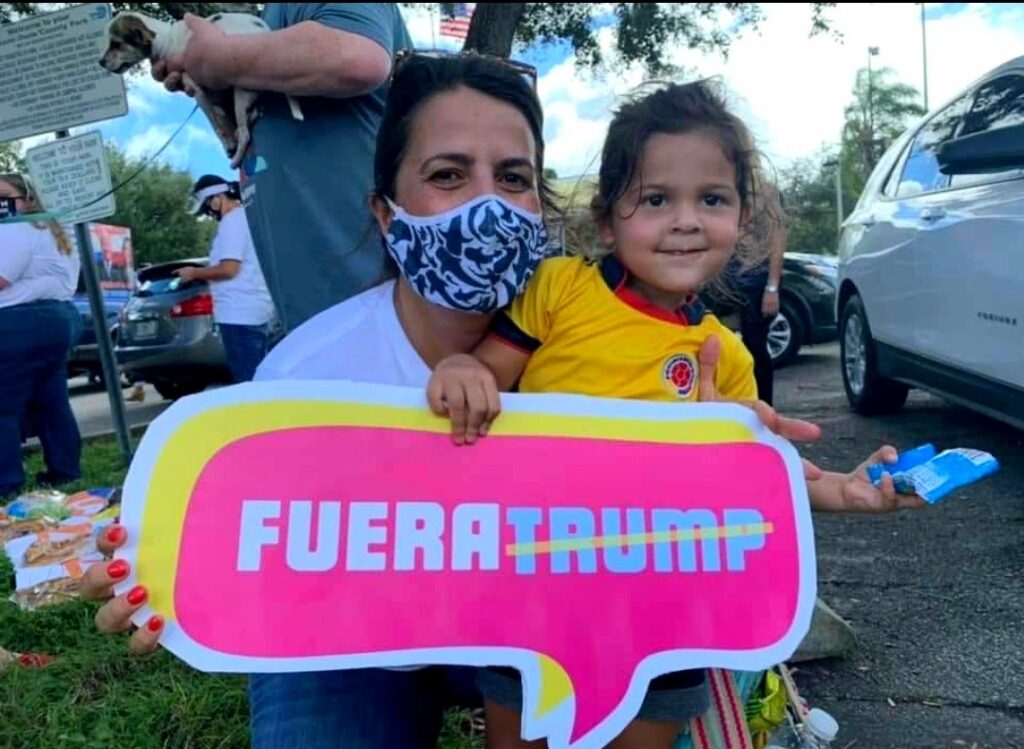
OBSTACLES
“The thing is that here there is a movement of the right and people have to understand that just as we are building a movement, they have their movement too and they are organized and VERY well organized.” says Serena.
The right wing has been present in Florida for decades. The fact that leaders like Gina, Carlos, Serena gave everything to be in these neighborhoods, as the only coalition really involving themselves on that level is a huge feat.
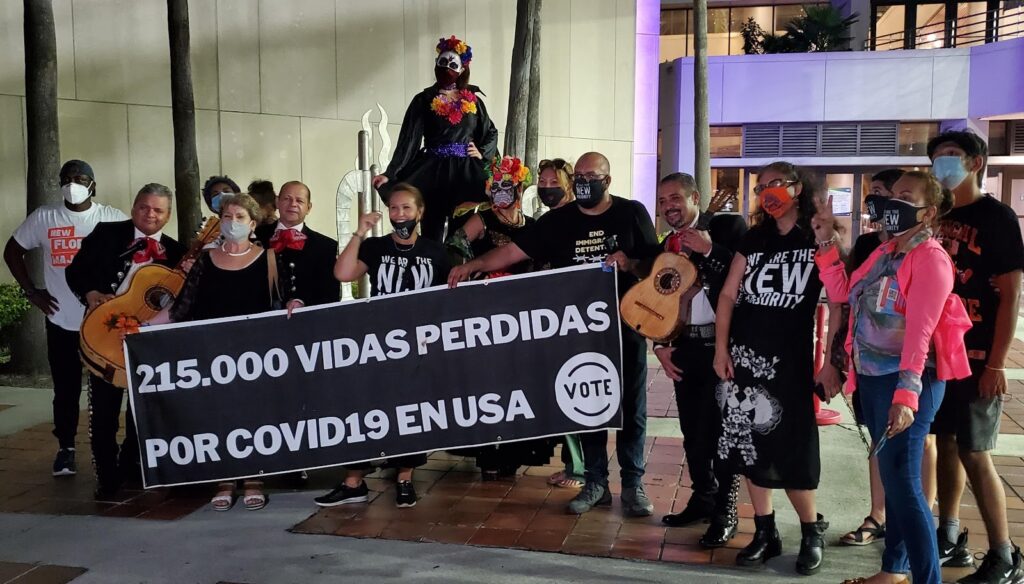
This year has been intense in so many ways, “we’ve been ramping up to defeat Trump and knowing that was the priority and galvanizing forces,” shares Carlos. He thinks about how 2020 started with the U.S. almost going to war with Iran, people dying because of COVID, and then Trump’s inept response to the pandemic, “a horror show,” he calls it.
“In Florida, we have a mini Trump,” says Carlos, referring to Ron De Santis, the governor of Florida who has been modeling himself after Trump. During the campaign, De Santis had this advertisement where he teaches his toddler how to ‘build the wall.’ “Being very cheeky about something barbaric like that…we had that level of neglect, that disregard for life, the importance of that violence,” Carlos tells us.
“Miami-Dade local power has been solidly in the hands of these super white Cuban and racist and xenophobic supremacists,” continues Serena. She mentions how many of these right wing neighborhoods are also filled with right wing organizations, service providers, churches.
“The fact that we are still able to compete in that territory is miraculous, brave. We don’t have an office and we don’t have a presence other than Gina, Carlos and our organizers there DANDOLE,” she tells us. According to Serena, they are definitely light years behind the infrastructure on the right. And yet she believes that as organizers they know that the only thing they can do is organize, organize and organize.
Beyond the right wing infrastructure there is also the aftermath of Amendment Four; an amendment to the Constitution of Florida passed thanks to the effort of organizers like Carlos, Gina and Serena and even conservative forces, as part of the 2018 Florida elections. The proposition restored the voting rights of Floridians with felony convictions.
“This was affecting, I think something like 1.4 million people,” shares Carlos. “And then something that happened in 2018 but culminated in 2020, was this massive obstruction of the people’s will of Florida.”
On September 11, 2020, the court ruled that the state of Florida can require former felons to pay all fines and fees before regaining the right to vote. “And that was a very nefarious way to find a loophole to cut the 1.4 million voters in half. So almost seven hundred thousand voters, mostly Black, people of color, were disenfranchised once again,” says Carlos sighing.
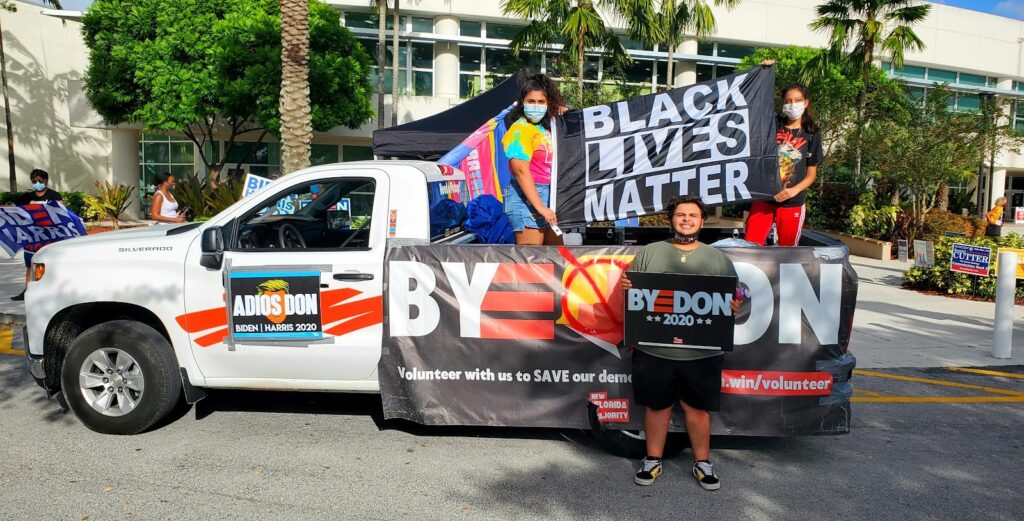
Natalia shares that all the main TV and radio stations, the papers, put out a strong pushback on socialism, like a scare tactic and tons of misinformation that drowned any effort they could put out as organizers.
“The Miami Herald found out that they were printing and distributing an insert saying that Black Lives Matter was violent and socialist. It was actually a news story inside the Herald,” shares Natalia.
She tells us that when confronted, the Miami Herald responded saying they “hadn’t noticed.” In September of this year, the Herald publicly apologized and the Nuevo Herald editor and deputy editor quit.
Where was the Democratic party in all of this? Gina says that the organizations worked much more than the Democratic Party.
“I really think that the Democratic Party lacked more courage,” she tells us. “It lacked more claws here in Florida and the organizations alone cannot do all the work. We came out like bullfighters ‘leaving our skin in the ring’ and still we are taken for granted.”
“The Democratic Party is not investing year round in talking to our communities. It has been a killer,” says Natalia. According to her, she saw that when it came time to invest in media, especially Latinx media, Florida was not the first state on the Democratic party’s mind.
“Here in Florida, we had a concentration camp for children, in Homestead. One of the most gigantic ones in the entire country,” says Carlos. “I did not see any Democratic candidate talking about these horrible issues, talking about immigrant children, about family values that are being destroyed on the right.”
“We weren’t the first state when the Biden campaign started knocking on doors,” she says. “The Republicans were knocking on doors throughout the whole epidemic.” And while she’s not encouraging putting people at risk, she says Florida should’ve still been prioritized, responsibly.
VICTORIES
In spite of all the hurdles that are continuously thrown at these incredible organizers, this year still held many victories. The NewFM mobilized more than 2 million Black and brown voters to the polls.
One of the biggest victories has been passing Amendment 2 to increase Florida’s minimum wage from $8.56 to $15. Curiously, even Trump voters came through to pass this amendment. Natalia tells us that Democratic leadership wasn’t in favor of passing Amendment 2, “it was really up to the movement to lift it up,” she says.
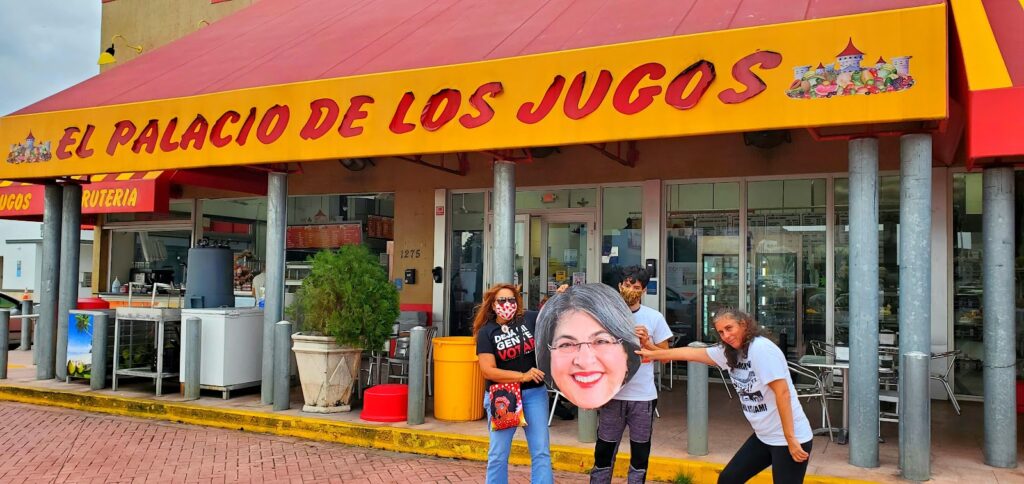
The elected mayor of Miami Dade, Daniella Levin Caba, who is a progressive candidate, has been in very close relationship with our organizers’ movements for years. In Broward, Harold Pryor won the race for State Attorney and Public Defender, being the first Black person to ever take on this role, and who was endorsed by NewFM.
“Three New Florida Majority organizers, Nancy Metayer, Kelly Thomas and Angie Nixon are now elected officials in the House of Representatives,” says Serena. Ninety five of NewFM’s 132 endorsed candidates won, including 70 of the 107 General Election endorsed races.
Shrevin Jones and Michelle Rayner became the first Black queer State Senators, representing District 35 and District 70.
“For me, apart from those victories that give us a lot of opportunities, I think the biggest opportunity is that we grew in our reach, in the depth with which we entered communities digitally,” shares Serena. “So we’ve learned a lot of ways to reach out and attract people who are ready for what’s next.”

WHAT’S NEXT
Carlos shares that the option to vote by mail helped so much in expanding democracy, which is an important value for NewFM. “It would be cool if those changes to the voting system became permanent,” he tells us.
The Florida legislative session is coming up early next year and according to the organizers there’s some important decisions being made that we need to be keeping our eyes on.
“There is legislation presented by De Santis that is absolutely abhorrent, unconstitutional and violent, which is to criminalize protests,” shares Serena.
She’s talking about the “Combating Violence, Disorder and Looting and Law Enforcement Protection Act,” which makes it a felony to obstruct a roadway or deface monuments as part of a “violent or disorderly assembly.”
“But if a car runs you over because you’re blocking traffic, the driver is not going to be penalized,” says Natalia. “Like in Charlotte, people can run over protesters and kill them, but if you stand in traffic with the sign, then you’re a felon.”
The proposal would also create a six-month mandatory minimum jail sentence for anyone who strikes an officer and withhold state funding and grants from local governments that attempt to cut law enforcement budgets.
“It’s outrageous and it’s super dangerous because they have the votes,” continues Serena. It’s important to make this visible and amplify it so we can support our fellow Floridians in defending their right to protest.
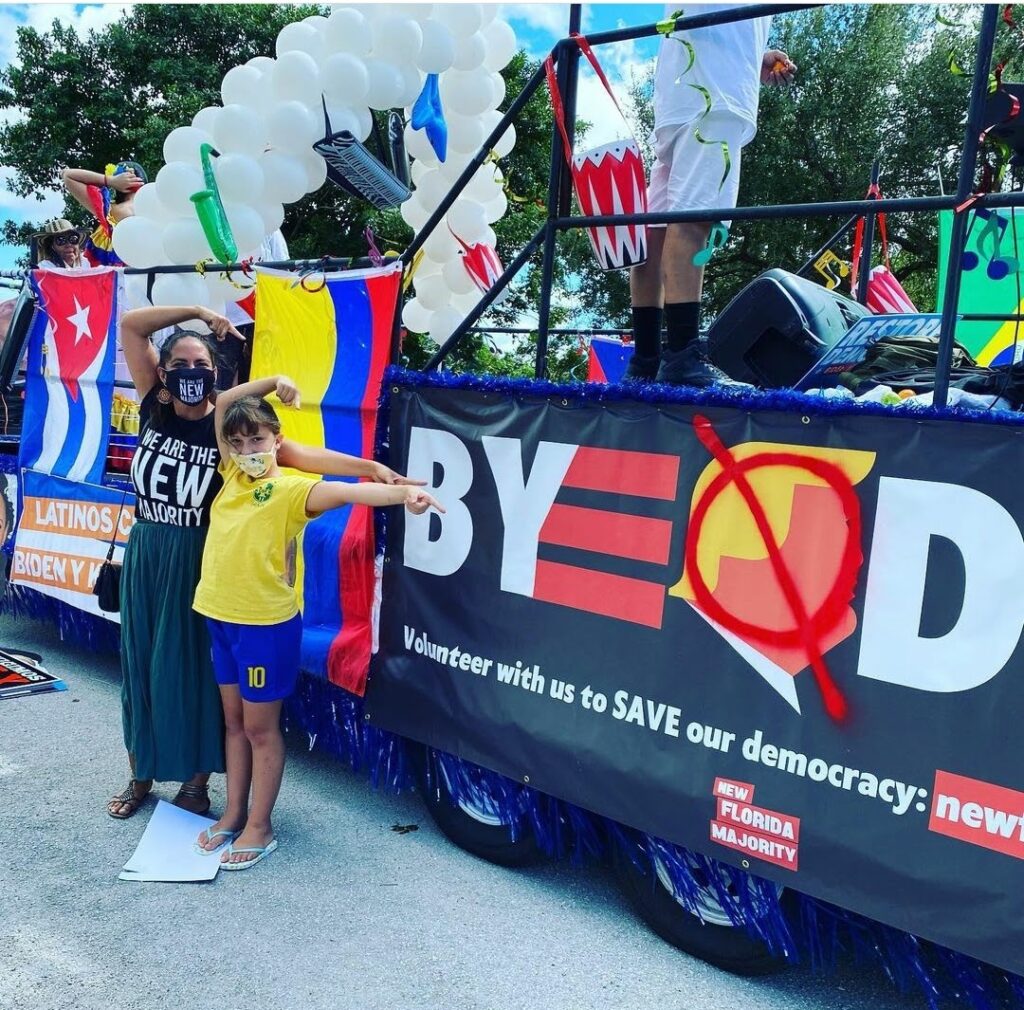
Carlos, Serena, Gina, Natalia and so many others have been giving their all this year and beyond to fight for a better Florida.
“During the elections I didn’t sleep, I was very hyper, I was anxious, I didn’t eat, I wasn’t hungry,” says Gina. “Sometimes I went to bed at night and would remember, ‘I did not eat today,’” Gina tells us that she just wanted to keep working, working and working.
For Carlos, lately he’s been trying to slow down a bit more, make time to cook for himself and try to sleep a little later. “I want to go out to nature more. Florida has such beautiful natural spaces,” he shares, “everytime there’s a break, I try to go to a swamp or a river.”
Serena, who has been leading the group says that she’s made it a practice to walk every day.
“I take some super long walks in the morning, but long, lazy, it’s not like exercising, but more like flying,” she tells us through the Zoom call while sitting in her car at the park. “I get to the park and I fly with the birds and the ducklings and I reflect and feed them, and it has saved my life. I think I’m never going to stop doing it.”